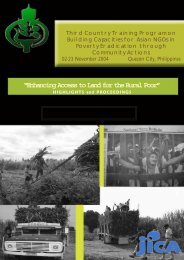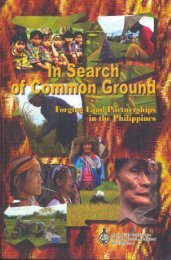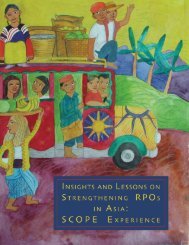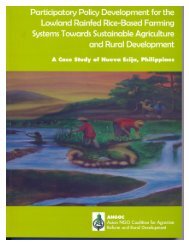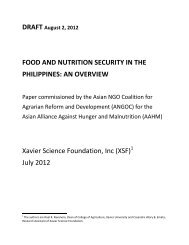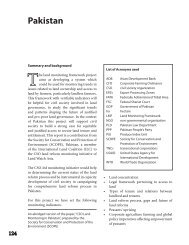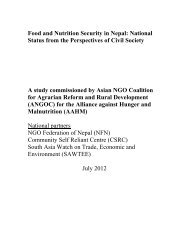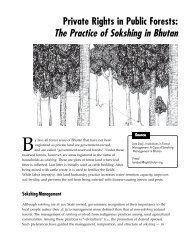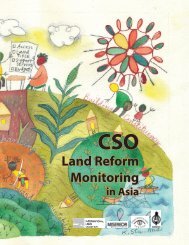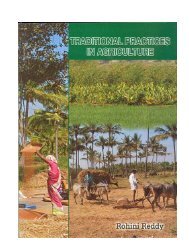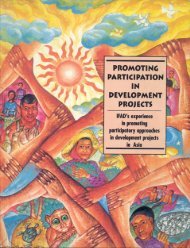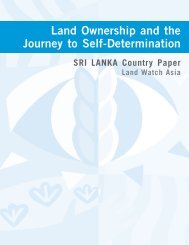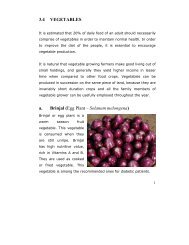Securing the Right to Land FULL - ANGOC
Securing the Right to Land FULL - ANGOC
Securing the Right to Land FULL - ANGOC
You also want an ePaper? Increase the reach of your titles
YUMPU automatically turns print PDFs into web optimized ePapers that Google loves.
donor agencies are holding back from making new commitments<br />
<strong>to</strong> fund agrarian reform.<br />
Forestry<br />
One recent major donor initiative in <strong>the</strong> forestry sec<strong>to</strong>r is <strong>the</strong><br />
Philippine Tropical Forest Conservation Foundation (PTFCF),<br />
which was established through a United States Agency for International<br />
Development (USAID)-sponsored debt swap. The<br />
foundation is managed by a board of trustees whose members<br />
include representatives from government, NGOs and USAID.<br />
The foundation provides support <strong>to</strong> NGOs and POs (in partnership<br />
with LGUs) that are engaged in reforestation activities.<br />
Many donors have likewise provided support for reforestation<br />
activities, among <strong>the</strong>m, <strong>the</strong> World Bank, <strong>the</strong> European Union<br />
(EU), <strong>the</strong> ADB, Japan Bank for International Cooperation (JBIC),<br />
and <strong>the</strong> International Fund for Agricultural Development (IFAD) .<br />
Indigenous Peoples<br />
Due <strong>to</strong> capacity gaps within NCIP, donors have stepped back<br />
from earlier commitments <strong>to</strong> support <strong>the</strong> agency’s operational<br />
projects, and instead, have chosen <strong>to</strong> focus on capacity building<br />
of <strong>the</strong> NCIP, that is, website development, education, and resource<br />
management planning. Most donor funding for field<br />
projects has been coursed through <strong>the</strong> DAR.<br />
There has been renewed interest in IP issues due <strong>to</strong> <strong>the</strong> passage<br />
of <strong>the</strong> UN Declaration of <strong>the</strong> <strong>Right</strong>s of Indigenous Peoples in September<br />
2007. This opens up opportunities <strong>to</strong> lobby <strong>the</strong> Philippine<br />
government for more effective implementation of IPRA.<br />
Fisheries<br />
There has been minimal donor support for fisherfolk settlement. In<br />
2003, DENR, <strong>the</strong> WB and AusAID started implementing a pilot<br />
project <strong>to</strong> introduce reforms in land administration and public land<br />
management in six municipalities of Leyte. As of July 2007, <strong>the</strong><br />
project registered 2,019 patents and of <strong>the</strong>se, 1,531 have already<br />
been distributed. Three of <strong>the</strong> municipalities covered by <strong>the</strong><br />
project—Palo, Tanauan and Barugo—are coastal municipalities.<br />
A key contribu<strong>to</strong>r <strong>to</strong> <strong>the</strong> fisheries sec<strong>to</strong>r, particularly <strong>the</strong> promotion<br />
of land access by small fisherfolk, is Oxfam (Great Britain<br />
and Hong Kong), which has supported <strong>the</strong> advocacy work and<br />
o<strong>the</strong>r activities of <strong>the</strong> NGOs for Fisheries Reform (NFR). Oxfam<br />
was also a major sponsor of <strong>the</strong> National Conference on<br />
Fisherfolk Settlement in November 2006.<br />
DEFENDING THE GAINS OF TENURIAL REFORM<br />
145<br />
Private Sec<strong>to</strong>r<br />
In general, private commercial interests have been a major ob-<br />
stacle in <strong>the</strong> struggle of <strong>the</strong> basic sec<strong>to</strong>rs <strong>to</strong> gain access <strong>to</strong> land<br />
or tenurial security.<br />
Agrarian Reform<br />
<strong>Land</strong>lord resistance is one of <strong>the</strong> major bottlenecks in <strong>the</strong> implementation<br />
of agrarian reform. This takes various forms, including:<br />
(i) not presenting <strong>the</strong> necessary documents; (ii) circumventing<br />
CARP by exploiting legal loopholes; (iii) using connections <strong>to</strong><br />
high-ranking government officials; and (iv) harassment of ARBs,<br />
leading in most cases <strong>to</strong> violence. Since 1998, as many as<br />
18,872 farmers and rural organizers have fallen victim <strong>to</strong> human<br />
rights violations. (PARRDS, 2007)<br />
Forestry<br />
Logging concessionaires take advantage of <strong>the</strong>ir Integrated<br />
Forest Management Agreements (IFMAs) <strong>to</strong> clear-cut forests.<br />
Only 10% of <strong>the</strong> area covered by Timber License Agreements<br />
(TLAs) are being reforested, and mostly with fast-growing species<br />
that will also be cut down. O<strong>the</strong>r replanting efforts involving<br />
<strong>the</strong> private sec<strong>to</strong>r consist of tree-planting activities by<br />
company employees along national highways ra<strong>the</strong>r than in<br />
denuded forest areas.<br />
Mining interests have targeted some 80,000 hectares for mining<br />
exploration, most of <strong>the</strong>se in forest areas. A recent Philippines–China<br />
agreement has earmarked some two million<br />
hectares for agribusiness plantations. These plantations are<br />
likely <strong>to</strong> cut across <strong>the</strong> country’s few remaining forest areas.<br />
Indigenous Peoples<br />
As a result of <strong>the</strong> National Minerals Policy, private investments—in<br />
mining, IFMAs, pasture lease agreements, palm oil<br />
plantations and orchards, and similar large-scale commercial<br />
enterprises—are being implemented in <strong>the</strong> ancestral lands of<br />
indigenous communities.<br />
Fisheries<br />
The establishment of industrial estates, power plants, ports,<br />
beach resorts, recreation facilities, etc. on foreshore lands and<br />
coastal areas has displaced communities of small fisherfolk. A<br />
number of small fisherfolk are enticed <strong>to</strong> sell <strong>the</strong>ir occupancy<br />
rights, or are forcibly removed. They usually no resistance because<br />
<strong>the</strong> lands <strong>the</strong>y occupy state-owned lands.<br />
ASIAN NGO COALITION FOR AGRARIAN REFORM AND RURAL DEVELOPMENT



